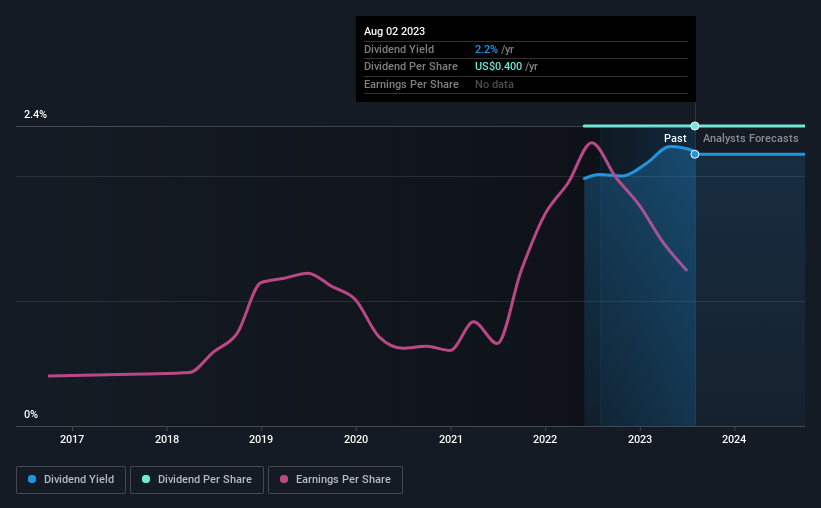Hanover Bancorp (NASDAQ:HNVR) Could Be A Buy For Its Upcoming Dividend
Readers hoping to buy Hanover Bancorp, Inc. (NASDAQ:HNVR) for its dividend will need to make their move shortly, as the stock is about to trade ex-dividend. The ex-dividend date is one business day before a company's record date, which is the date on which the company determines which shareholders are entitled to receive a dividend. The ex-dividend date is important as the process of settlement involves two full business days. So if you miss that date, you would not show up on the company's books on the record date. This means that investors who purchase Hanover Bancorp's shares on or after the 8th of August will not receive the dividend, which will be paid on the 16th of August.
The company's upcoming dividend is US$0.10 a share, following on from the last 12 months, when the company distributed a total of US$0.40 per share to shareholders. Based on the last year's worth of payments, Hanover Bancorp has a trailing yield of 2.2% on the current stock price of $18.4. Dividends are a major contributor to investment returns for long term holders, but only if the dividend continues to be paid. As a result, readers should always check whether Hanover Bancorp has been able to grow its dividends, or if the dividend might be cut.
Check out our latest analysis for Hanover Bancorp
Dividends are usually paid out of company profits, so if a company pays out more than it earned then its dividend is usually at greater risk of being cut. Hanover Bancorp is paying out just 13% of its profit after tax, which is comfortably low and leaves plenty of breathing room in the case of adverse events.
Companies that pay out less in dividends than they earn in profits generally have more sustainable dividends. The lower the payout ratio, the more wiggle room the business has before it could be forced to cut the dividend.
Click here to see the company's payout ratio, plus analyst estimates of its future dividends.
Have Earnings And Dividends Been Growing?
Stocks in companies that generate sustainable earnings growth often make the best dividend prospects, as it is easier to lift the dividend when earnings are rising. Investors love dividends, so if earnings fall and the dividend is reduced, expect a stock to be sold off heavily at the same time. That's why it's comforting to see Hanover Bancorp's earnings have been skyrocketing, up 24% per annum for the past five years.
We'd also point out that Hanover Bancorp issued a meaningful number of new shares in the past year. Trying to grow the dividend while issuing large amounts of new shares reminds us of the ancient Greek tale of Sisyphus - perpetually pushing a boulder uphill.
Unfortunately Hanover Bancorp has only been paying a dividend for a year or so, so there's not much of a history to draw insight from.
To Sum It Up
From a dividend perspective, should investors buy or avoid Hanover Bancorp? When companies are growing rapidly and retaining a majority of the profits within the business, it's usually a sign that reinvesting earnings creates more value than paying dividends to shareholders. This is one of the most attractive investment combinations under this analysis, as it can create substantial value for investors over the long run. Hanover Bancorp ticks a lot of boxes for us from a dividend perspective, and we think these characteristics should mark the company as deserving of further attention.
So while Hanover Bancorp looks good from a dividend perspective, it's always worthwhile being up to date with the risks involved in this stock. For example, we've found 1 warning sign for Hanover Bancorp that we recommend you consider before investing in the business.
If you're in the market for strong dividend payers, we recommend checking our selection of top dividend stocks.
Have feedback on this article? Concerned about the content? Get in touch with us directly. Alternatively, email editorial-team (at) simplywallst.com.
This article by Simply Wall St is general in nature. We provide commentary based on historical data and analyst forecasts only using an unbiased methodology and our articles are not intended to be financial advice. It does not constitute a recommendation to buy or sell any stock, and does not take account of your objectives, or your financial situation. We aim to bring you long-term focused analysis driven by fundamental data. Note that our analysis may not factor in the latest price-sensitive company announcements or qualitative material. Simply Wall St has no position in any stocks mentioned.

